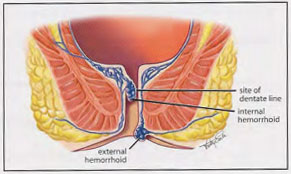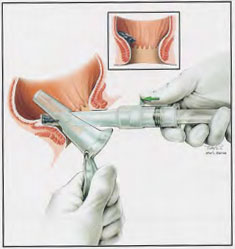
Hemorrhoid Banding Preparation Instructions
Your colorectal health is an important part of a long, productive and pain-free life. Common problems like hemorrhoids and anal fissures can cause recurring pain, itching and bleeding. Even worse, rectal bleeding may be a sign of undiagnosed colorectal cancer.
What Are Hemorrhoids?

Hemorrhoids are swollen veins in the lower rectum or anus caused by increased pressure or straining. They can be painful, itch, bleed, enlarge, clot and extend outside the anus (prolapse). This very common condition affects about half of Americans by age 50. Unfortunately, hemorrhoids often don’t go away on their own, and they tend to get worse over time.
Get permanent relief from hemorrhoids.

“Banding,” or cutting off a hemorrhoid’s blood supply with tiny rubber bands, is the most common and effective hemorrhoid removal treatment in use today. (Over-the-counter remedies only treat symptoms, not the underlying problem). In our practice, we have taken banding to a new level of excellence. We utilize the patented CRH-O’Regan Disposable Hemorrhoid Banding System which is smaller and more comfortable for patients and uses gentle suction instead of a metal-toothed forceps to grasp the hemorrhoid, thus significantly reducing the risk of pain and bleeding. Also, because the device is 100% disposable and single-use, the risk for cross-patient infection (i.e. HIV, hepatitis B and C) associated with inadequately sterilized conventional equipment is eliminated. The hemorrhoid typically falls off within a day or so, and 99.8% of patients have no post-procedure pain. Performed in our offices in as little as 60 seconds, the banding technique has been found to be 99.1% effective.
What Is An Anal Fissure?
An anal fissure is a small tear in the tissue lining the anus, often caused by passing hard, dry stool. Like hemorrhoids, anal fissures are extremely common and can cause bleeding, itching and pain. For those with fissures, a bowel movement can be excruciating, as if you’re “passing glass.” An anal fissure can be classified as acute (recent onset) or chronic (recurrent or long-term). Chronic fissures often require medical treatment for permanent resolution. We also treat fissures non-surgically, which is better for preserving bowel control. Our treatments reduce muscle spasm and increase blood supply, helping fissures heal faster. Because good bowel care is important to recovery, we also teach you how to avoid constipation and straining, which can prevent the fissure from healing completely.
Are You At Risk For Colorectal Cancer?
Colorectal cancer is the number two cancer killer in the U.S., with more than 55,000 deaths annually. While it is highly preventable and curable if detected early, the disease often produces no symptoms, making it a “silent killer.” More than 90% of those diagnosed with colorectal cancer are over the age of 50. In addition, research shows that up to 2.3% of people with bleeding hemorrhoids also have colorectal cancer.
You have hemorrhoids. Now what?
The Experts Speak
You have been diagnosed with hemorrhoids. We know you may be in discomfort and are perhaps worried a bit. But now that you know what the problem is, you can do something about it. Hemorrhoids are best treated before they become so severe that they require surgery, which can be expensive, painful and require a prolonged recovery. The following recommendations are helpful for minimizing an initial bout of rectal bleeding, itching and pain.
Try these self-treatments first to determine if your hemorrhoids will resolve on their own:
- Take a 15-minute sitz bath (a warm bath with a tablespoon of table salt added) three times per day and after each bowel movement if possible. Gently dry your bottom.
- Avoid constipation by increasing the amount of fiber and liquids in your diet. Stool softeners may be helpful to avoid constipation.
- Avoid sitting on the commode for more than two minutes to prevent excessive straining. If you can’t have a bowel movement in that time, come back later.
- Avoid prolonged sitting or other activities that wi ll increase the pressure on your bottom. If you work at a desk all day, get up and take breaks whenever you can.
- There are many creams or suppositories for hemorrhoids, but they have limited benefits.
If you are not better within one to two weeks, please call our office to discuss our fast, safe and painless treatment method to remove your hemorrhoids. Hemorrhoids that don’t clear up initially tend to get worse over time, growing in both size and number. The sooner you make an appointment for medical treatment, the sooner you can get permanent relief.
Anyone with hemorrhoids containing blood clots-which can cause excruciating pain – should be seen by a specialists as soon as possible.
